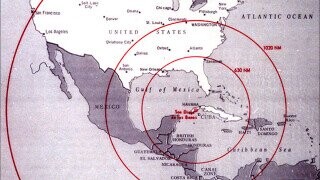That Time Soccer Fields Nearly Caused Another Cuban Missile Crisis

Cubans play soccer. They competed in the 1938 World Cup, and there has been a Cuban professional league since 1912. According to Henry Kissinger, in 1970, though, the presence of soccer fields could have meant that the Soviets were once again setting up missiles on Cuban soil, and this could've led to a new Cuban Missile Crisis.
In September 1970, Henry Kissinger received recon photos taken from American spy planes over Cuba. Soviet ships had been traveling to Cuba in the months leading up to this, and the American government needed to know what was up. There had been a flotilla and other signs of construction. The fear was that a full-scale base was being built, and if this were the case, the Soviets would once again be able to launch nuclear weapons at the United States from such a short distance that the Americans would have no time to respond.
Don't Miss
The construction and presence of Soviet ships may have been an ominous sign, but the most damning evidence to Henry Kissinger was nothing military-related at all. One day, Kissinger stormed into White House Chief of Staff H.R. Haldeman's office with photos from a U-2 that President Nixon needed to see. The photos showed that Cubans were building soccer fields. According to Haldeman, Kissinger said, "Cubans play baseball. Russians play soccer." In Kissinger's mind, the only reason soccer fields would be built in Cuba would be if Russians would be staying there long-term.

Now, this idea that Cubans don't play soccer is, again, wrong, but the fear over Russian construction in Cuba was real. The 1962 Cuban Missile Crisis was about as close as humanity has ever come to blowing itself into oblivion, and if the Soviets were going to put more missiles there, then the world was going to enter another crisis.
Fortunately, it never got to that point. Kissinger met with a Soviet ambassador to discuss the concerns, and on October 5, 1970, the Soviets agreed to not construct anything in Cuba that would violate the 1962 agreement that ended the original Cuban Missile Crisis.
This crisis, if it was ever going to become one, was averted before it began. The Cold War was filled with instances of the U.S. and Soviet Union pushing each other's boundaries just to see what they could get away with. It's hard to say that Henry Kissinger saved the day here, as there is no way of knowing if the Soviet ships and construction ever posed any real threat. One thing is for certain, though: seeing soccer fields meant nothing. Because Cubans play soccer.
Sometimes in America's capital, even.
Top Image: CIA